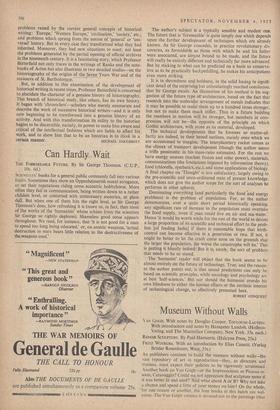Can Hardly Wait
THE FORESEEABLE FUTURE. By Sir George Thomson. (C.U.P., 10s. 6d.) SCIENTIST s' books for a general public commonly fall into various faults. Sometimes they show an Oppenheimerish moral arrogance, or set their reputations riding some eccentric hobbyhorse. More often they fail in communication, being written down to a rather childish level, or contorted with unnecessary esoterica, or plain dull. But when one of them hits the right level, as Sir George Thomson's does, how refreshing it is (more so, in fact, than most of the works of the 'humanists' whose schism from the scientists Sir George so rightly deplores). Shameless good sense appears throughout. We read, for instance, that 'it is not good for a man to spend too long being educated,' or, on atomic weapons, 'actual destruction in wars bears little relation to the destructiveness of the weapons used. The author's subject is a typically sensible and modest one. The future that is 'foreseeable' is quite simply one which depends upon the further development of techniques which are already known. As Sir George concedes, in practice revolutionary dis- coveries, as formidable as those with which he and his father were associated, are aln2ost bound to be made, and the future will really be entirely different and technically far more advanced. But by sticking to what can be predicted on a basis so conserva- tive as to be practically backpedalling, he makes his anticipations even more striking.
It is in shrewdness and boldness, in the solid basing in signifi- cant detail of the surprising but unhesitatingly reached conclusion. that Sir George excels. An illustration of his method is his sug- gestion of the future type of architecture, based on the fact that research into the molecular arrangement of metals indicates that it may be possible to make them up to a hundred times stronger, but not to make them much stiffer. Thus in a future building the members in tension will be stronger, but members in com- pression will not be—the opposite of the principle on which Gothic architecture, with stone as its material, developed.
The technical developments that he foresees so matter-of- factly are indeed, in their broad outlines, mainly ones which we are accustomed to imagine. The interplanetary rocket comes as the climax of transport development (though the author seems a trifle pessimistic in his mass-ratio estimates). For the rest we have energy sources (nuclear fusion and solar power), materials, communications (the limitations imposed by information theory), food (chlorella, synthetics, etc.), and some applications of biology. A final chapter on 'Thought' is less satisfactory, largely owing to the pre-scientific and unco-ordinated state of present knowledge, which does not give the author scope, for the sort of analyses he performs in other spheres.
Dominating everything (and particularly the food and energy problems) is the problem of population. For, as the author demonstrates, over a quite short periad historically speaking. , any significant rate of increase in the population must overtake the food supply, `even if man could live on air and sea-water.' Hence `it would be worth while for the rest of the world to devote a large proportion of its scientific and technical effort to the prob- lem [of feeding India] if there is reasonable hope that birth- control can become effective in a generation or two. If not, it might be better to let the crash come soon on the grounds that the larger the population, the worse the catastrophe will be.' This is putting it bluntly indeed. But it is, surely, the sort of problem that needs to be so stated.
The `humanist' reader will object that the book seems to be almost entirely on the future of technology, True; and, the reason. as the author points out, is that sound predictions can only he based on scientific principles, while sociology and psychology arc at best 'half-sciences.' But nor should the humanist overdo his own blindness to either the human effects or the intrinsic interest of technological change, so effectively presented here.
ROBERT CONQUEST










































 Previous page
Previous page